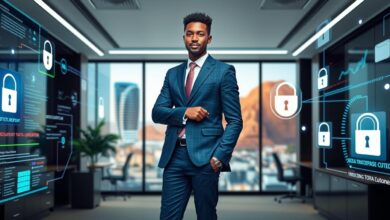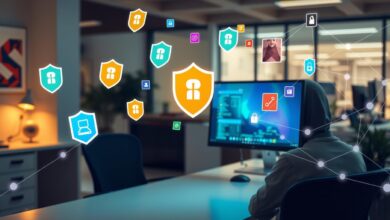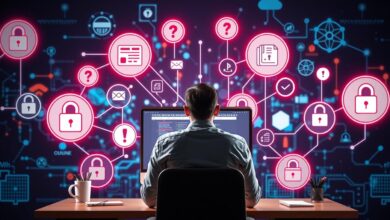Tips for Safe Browsing to Avoid Online Scams
In today’s digital world, it’s crucial to know how to stay safe online. Cyber threats are getting smarter, so we all need to up our game. With more devices connected to the internet, keeping them safe is key.
Now, most people shop and browse on their phones. This means we need to protect our devices in different ways. It’s not just about computers anymore.
This article will share important tips for staying safe online. We’ll cover how to manage passwords, spot phishing scams, and make sure your online transactions are secure. With the right info and tools, you can lower your risk of falling prey to cybercrime. Let’s make your online experience safer together.
Understanding the Cyber Threat Landscape
The world of cyber threats is always changing. It poses big challenges to both people and businesses. With technology in our lives more than ever, it’s crucial to know about online scams. This knowledge helps us protect our information and stay safe online.
Common Types of Online Scams
Cyber criminals use many tricks to catch people off guard. Here are some common scams:
- Phishing: Fake emails that try to get your personal info.
- Ransomware: Bad software that locks your files and asks for money to unlock them.
- Mobile payment fraud: Tricks that target mobile payment apps and services.
- Identity theft: When someone uses your identity for their own gain.
- Fake websites: Lookalike sites that try to steal your sensitive data.
The Growing Importance of Online Safety
By April 2024, 5.44 billion people were using the internet. This huge number means more risks online. Cyber-attacks now target everyone, from individuals to big systems. It’s vital to know about these threats and protect ourselves.
Using strong passwords and multi-factor authentication can help a lot. These steps make it harder for hackers to get to you.
Tips for Safe Browsing to Avoid Online Scams
Safe browsing is key to staying secure online. Knowing how to spot secure websites and use encryption helps a lot. These steps can keep your online life safe from scams.
Recognizing Secure Websites
Checking if a website is secure is very important. Look for “HTTPS” in the URL and a padlock symbol in the address bar. These signs mean the site is safe for sharing your info.
Be careful with sites that don’t show these signs. They might not protect your personal info well.
Using Encryption for Enhanced Security
Encrypting your data adds extra protection. It keeps your info safe from hackers when you’re online. Always choose websites with SSL certificates for your safety.
Doing this helps prevent bad guys from getting your personal info. It makes your online time safer.
Creating Strong and Unique Passwords
Creating strong and unique passwords is key in today’s digital world. It’s smart to make passwords complex and hard to guess. Using letters, numbers, and symbols makes passwords stronger and helps fight online scams.
Best Practices for Passwords
To manage passwords well, follow these tips:
- Passwords should have at least 12 characters for better security.
- Avoid using personal info like names or birthdays.
- Include uppercase and lowercase letters, numbers, and symbols.
- Use password generators for strong, random passwords.
- Try mnemonic devices to remember complex passwords.
Mistakes include picking easy-to-guess patterns and using the same password everywhere. A good example of a strong password is “m#P52s@ap$V.” It shows how mixing characters boosts security.
The Role of Password Managers
Password managers like LastPass, 1Password, and Google Chrome’s manager are great for online safety. They help keep and manage many passwords securely. This makes it easier to have unique passwords for each account.
These tools make it easier to create and remember strong passwords. This is crucial for protecting different accounts. With their help, you can avoid simple or repeated passwords, lowering the risk of unauthorized access.
Installing Reliable Antivirus Software
In today’s world, having good antivirus software is key. Cyber threats are always changing, so we need strong protection. Antivirus helps keep our devices and personal info safe from online dangers like malware and phishing.
Benefits of Antivirus Protection
Antivirus software is vital for keeping us safe online. It scans for malware, reducing the chance of cyber fraud and spyware threats. Spyware can harm our personal and financial data.
Studies show that websites with adult content often have spyware. So, having strong protection is crucial. Using antivirus with firewalls can cut spyware risks by up to 95%. This combo makes online activities much safer.
Choosing the Right Antivirus Software
Choosing the right antivirus software is important. Look for features and how well it performs. Webroot Internet Security Plus is fast, scanning 60 times quicker than others.
It’s also important to have in-house customer support, like Webroot’s team in Colorado. This ensures high satisfaction. By comparing different options, you can find the best fit for your needs and stay safe online.
Keeping Your Software Up to Date
Keeping your software up to date is key to keeping your system safe. With new cyber threats popping up all the time, it’s crucial to stay current. Updates often include important security fixes that help prevent fraud online.
Both businesses and individuals should make updates a top priority. This is a big part of staying safe online.
Importance of Regular Updates
Regular updates protect your devices from new threats. Many cyberattacks target old software with known weaknesses. By keeping your software updated, you lower your risk of getting scammed.
For example, places like the University of Idaho have strict rules. They make sure all devices get updates from trusted sources. This helps keep everyone’s tech safe and secure.
How to Enable Automatic Updates
Turning on automatic updates is a smart move for security. Here’s how to do it:
- Go to your operating system’s settings and turn on automatic updates.
- Set apps like web browsers and antivirus to update automatically.
- Check for updates manually sometimes to make sure you’re up to date.
- Use tools like Microsoft Endpoint Configuration Manager for Windows and Jamf Pro for Mac to manage updates.
Avoiding Phishing Scams
Phishing scams are a big problem online today. They trick people into sharing personal info like bank details and social security numbers. Knowing how to spot these scams is key to staying safe online.
Identifying Phishing Attempts
Spotting phishing scams is crucial for staying safe. Scammers try to look real, making it hard to know who to trust. Here are some signs of phishing:
- Unfamiliar sender addresses: Always check the email address. Phishing emails might look like they’re from real companies.
- Urgent requests for information: Be careful of emails that rush you to give out personal info or log in.
- Generic greetings: Phishing emails often use “Dear Customer” instead of your name.
- Unexpected attachments or links: Don’t click on links or open attachments unless you’re sure they’re safe.
Safe Email Practices
Staying safe online starts with good email habits. These practices help keep your info secure:
- Verify the authenticity: Always check if emails asking for personal info are real.
- Employ multi-factor authentication: This adds extra security by needing more than just a password.
- Report suspicious emails: If an email seems fishy, report it and delete it right away.
By being careful and following safe email practices, you can avoid phishing scams. Learning to spot phishing attempts helps everyone stay safe online.
Implementing Two-Factor Authentication
With cyber threats on the rise, using two-factor authentication (2FA) is now crucial. It adds an extra layer of security beyond just passwords. This means using two or more ways to verify who you are. Many websites now require 2FA, showing its importance in keeping online accounts safe.
What is Two-Factor Authentication?
Two-factor authentication asks for two different things when you log in. You might need a password and a code sent to your phone. This makes it harder for hackers to get into your account, even if they guess your password.
The Benefits of Enhanced Security
There are many good reasons to use two-factor authentication. Some of the main benefits are:
- Increased Security: It makes it much harder for hackers to get into your account, keeping your personal info safe.
- Widespread Adoption: As more places start using 2FA, everyone’s online world gets safer.
- Protection Against Phishing: 2FA helps stop phishing scams that try to steal your login details.
- Encouragement of Best Practices: Using 2FA with apps and password managers helps you stay safe online.
In today’s world, where cyber threats keep getting smarter, 2FA is a key tool for staying safe. By adding this simple step, you can make your online world much safer and keep your personal info secure.
Shopping Safely Online
Online shopping is popular, but it has risks. Knowing how to shop safely online is key. This way, you can enjoy the convenience without getting scammed. By choosing trusted retailers and being careful at checkout, you can shop online safely.
Recognizing Legitimate Retailers
It’s important to know who you’re buying from online. Look for these signs:
- Secure payment methods, like major credit cards or trusted payment gateways.
- Clear return policies.
- Customer reviews and ratings on independent platforms.
- Contact info with a physical address and phone number.
These signs help prevent scams. They show the retailer is open and can solve problems.
What to Look for During Checkout
Here are some tips for safe checkout:
- Make sure the website’s URL starts with “https:” for a secure connection.
- Be cautious of new or unknown websites, as they might not be trustworthy.
- Check links before clicking to make sure they’re real, as scammers fake URLs.
- Keep an eye on your credit card statement for any unauthorized charges.
By following these tips, you can shop online safely. This helps you avoid scams and find trusted retailers.
Protecting Your Personal Information
In today’s digital world, keeping your personal info safe is key. Knowing what to keep private helps stop identity theft and scams. By using good online safety habits, you can protect your sensitive data online.
What Information Should You Keep Private?
It’s important to know which info is sensitive and should stay private:
- Social Security numbers
- Financial info, like bank account details
- Personal identification numbers (PINs) and passwords
- Address and contact details
- Any info that could be used for security questions, like your mom’s maiden name
Be careful about sharing this data, even in safe places. Cybercriminals use public info to scam people.
Best Practices for Information Sharing
Following best practices for sharing info can lower the risk of data breaches. Here are some tips:
- Use privacy settings on social media to limit who sees your info.
- Share sensitive info only over secure, encrypted channels.
- Change your passwords often, using a mix of letters, numbers, and symbols.
- Teach family members, especially seniors, to spot online scams.
- Backup your data regularly to prevent loss and reduce scam damage.
By taking these steps to avoid scams, you help make the internet safer for everyone. Staying alert and following these tips builds a safer online community.
Conclusion
Keeping safe online is key to fight off digital scams. People can protect themselves by spotting phishing, using strong passwords, and keeping personal info safe. It’s also vital to stay updated on new cyber threats.
Online safety is not just for individuals but also for businesses. Cybercriminals use many tactics, like email scams and fake profiles. Working together to raise awareness can make the internet safer for all.
By making safe browsing a habit, we can all stay protected. Keeping software up to date, using antivirus, and enabling two-factor authentication are good steps. These actions help shield us from online scams and deception.
FAQ
What are some tips for safe browsing to avoid online scams?
How can I identify phishing scams?
What makes a password strong?
Why is two-factor authentication important?
How can I protect my personal information online?
What should I do if I suspect I’ve fallen victim to a scam?
How often should I update my antivirus software?
What are some safe online shopping practices?
Why is keeping software up to date important?
Published on: 23 de September de 2024

Bakari Romano
Bakari Romano is a finance and investment expert with a strong background in administration. As a dedicated professional, Bakari is passionate about sharing his knowledge to empower individuals in managing their finances effectively. Driven by this mission, he founded FinancasPro.com, where he provides insightful and practical advice to help people make informed financial decisions. Through his work on the site, Bakari continues to make finance accessible and understandable, bridging the gap between expert knowledge and everyday financial needs.






